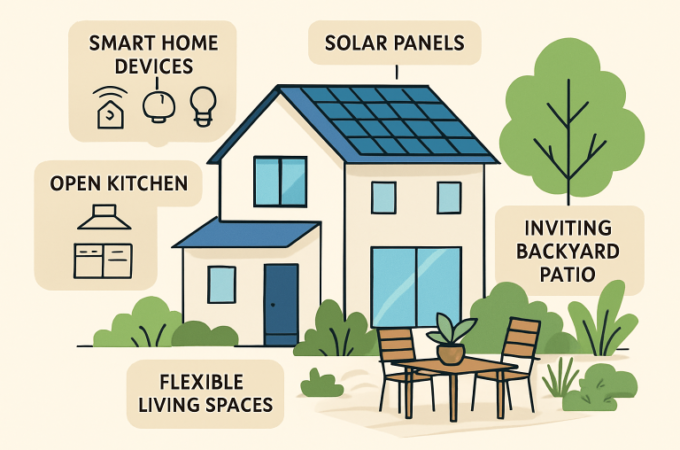
Wake County Real Estate: Listings, Sales, and More
Table of Contents
ToggleWake County Real Estate Overview
Market Dynamics
The Wake County real estate market is experiencing steady growth. Demand for properties in the area remains consistently high, creating a favorable environment for both buyers and sellers. This means that whether you’re looking to buy or sell a property, you can expect an active and vibrant market. As a buyer, this means having plenty of options to choose from, while sellers can benefit from competitive offers.
The availability of different property types in Wake County caters to a wide range of budgets and preferences. Whether you’re in the market for a spacious single-family home, a low-maintenance townhouse, or a modern condo, there’s something for everyone in Wake County. This diversity ensures that individuals with varying needs and financial capabilities have the opportunity to find their ideal home within the county.
Price Trends
Over the years, Wake County has seen consistent increases in property prices. The strong upward trend indicates robustness within the real estate market. For potential buyers considering purchasing property in Wake County, it’s crucial to be aware of these price trends so they can make informed decisions about their investments. While rising prices may present challenges for buyers on one hand, they also signify potential returns on investment should they decide to sell their properties down the line.
Investment Potential
Investing in Wake County real estate presents excellent opportunities due to its growing economy and population. Historically speaking, real estate investments within Wake County have yielded favorable returns over time. With such promising prospects driven by economic growth and population expansion, investors stand poised to maximize their investment potential through strategic acquisitions within this thriving market.
Wake County Real Estate Listings
Searching Homes
There are numerous online platforms available for home searches. Buyers can conveniently utilize real estate websites and apps, streamlining their search process from the comfort of their homes. These digital platforms provide accessibility and convenience for individuals looking to explore the diverse range of properties in Wake County.
For instance, popular real estate websites like Zillow and Realtor.com offer comprehensive databases of homes for sale in Wake County. With just a few clicks, potential buyers can access a plethora of property listings, complete with detailed descriptions and high-quality images. This allows them to efficiently narrow down their search based on specific criteria such as location, price range, or property type.
These online platforms often feature advanced search filters that enable buyers to refine their preferences further. Whether it’s seeking a single-family home in a particular neighborhood or exploring condos with specific amenities, these digital tools empower buyers to customize their search according to their unique requirements.
Listing Features
Property listings play a crucial role in providing prospective buyers with essential details about available homes in Wake County. These listings offer comprehensive information regarding the features and amenities of each property, aiding buyers in making informed decisions about potential purchases.
Buyers can easily find vital specifics such as the number of bedrooms, bathrooms, square footage measurements, as well as additional features like outdoor spaces or parking facilities within these listings. This wealth of information enables individuals to evaluate properties based on their desired specifications without physically visiting each one separately.
Moreover, many property listings also showcase virtual tours or interactive multimedia elements that allow potential buyers to explore the interior and exterior aspects of homes virtually. This immersive experience provides an invaluable opportunity for individuals to visualize themselves living within these properties before scheduling any physical viewings.
Buyer’s Guide
Individuals interested in purchasing real estate within Wake County have access to a comprehensive buyer’s guide designed specifically for this market. The guide offers valuable insights into various aspects related to the buying process while navigating through the local real estate landscape effectively.
From understanding financing options such as mortgages or loans tailored for first-time homebuyers to gaining knowledge about legal considerations when finalizing property transactions – this buyer’s guide equips potential purchasers with essential information every step along the way throughout their real estate journey.
Wake County Real Estate Sales
Studying recent transactions in Wake County is crucial for understanding the current state of the real estate market. By examining these transactions, both buyers and sellers can gain valuable insights into property values and buyer/seller trends. For instance, a recent surge in sales prices might indicate high demand for properties in certain areas of Wake County. On the other hand, a decrease in transaction volume could suggest a cooling off of the market.
Buyers and sellers alike can stay updated on the latest transactions to make well-informed decisions. For example, potential buyers can gauge whether it’s a favorable time to enter the market based on recent sale prices and property availability. Similarly, sellers can use this information to set competitive listing prices or determine when it might be advantageous to put their property on the market.
Wake County Real Estate Records Search
Public Access
Public access to Wake County real estate information is convenient through online databases. These portals provide property records, tax details, and other relevant data for transparency. Whether you’re a buyer, seller, or investor, accessing this information can be crucial for making informed decisions.
Understanding the significance of property records is vital when dealing with Wake County real estate. Property records encompass essential details about ownership, liens on the property, and historical data that can influence your decision-making process. Familiarizing yourself with these records can help you navigate the complexities of real estate transactions more effectively.
Research Tips
When engaging in Wake County real estate transactions, conducting thorough research is paramount. Research tips play a pivotal role in helping buyers and sellers gather pertinent information to compare properties and make well-informed decisions. By following these tips diligently, individuals can ensure a smooth and successful experience in the realm of real estate.
Wake County Real Estate Appraisal Visits
The appraisal process is crucial in determining the value of a property in Wake County. Licensed professionals assess various factors like location, condition, and comparable sales to determine an accurate value. This process is essential for both buyers and sellers to ensure fair pricing.
Understanding its intricacies can make a significant difference for individuals involved in real estate transactions. For example, knowing how appraisers evaluate properties based on recent sales data and market trends can help sellers set realistic prices. Similarly, buyers can benefit from understanding how appraisals influence mortgage approvals and negotiations with sellers.
Wake County Real Estate Annual Tax Bill
Tax Rates
Wake County real estate properties are subject to specific tax rates, which vary based on the property’s location and type. Understanding these tax rates is crucial for both buyers and sellers, as it directly impacts their financial planning. For instance, a buyer looking to invest in a property needs to calculate the potential expenses accurately before making a purchase decision. Similarly, sellers must consider the applicable tax rates when determining their expected returns from selling a property.
Being aware of the tax rates enables individuals to plan their finances effectively. For example, if someone is considering purchasing a home in Wake County, knowing the exact tax rate allows them to budget for future expenses such as property taxes. This knowledge also helps individuals make informed decisions about which properties align with their long-term financial goals.
Payment Process
The payment process for real estate transactions in Wake County involves several essential steps that buyers need to understand thoroughly. These steps include down payments, mortgages, and closing costs. Familiarizing oneself with this process is vital for ensuring a smooth transaction when buying or selling real estate.
Working with experienced professionals such as real estate agents or mortgage brokers can significantly aid individuals in navigating the payment process efficiently. For example, first-time homebuyers may benefit from seeking guidance from professionals who can explain each step of the payment process clearly and help them understand their financial obligations more comprehensively.
Disputing Taxes
In cases where property owners believe that their property taxes have been inaccurately assessed or seem unfair, there are procedures in place within Wake County to address such disputes effectively. Property owners have rights regarding disputing tax assessments and should be familiar with these processes if they encounter any issues related to their annual tax bill.
Understanding how to dispute taxes empowers property owners by providing them with avenues through which they can resolve any discrepancies or concerns regarding their annual tax bills proactively. By being well-informed about these procedures, property owners can ensure that they are not overpaying on their taxes due to inaccurate assessments.
Wake County Real Estate Climate and Demographics
Weather Patterns
Wake County’s moderate climate offers residents the experience of four distinct seasons. The area enjoys mild winters, warm summers, and pleasant springs and autumns. This variety in weather patterns caters to individuals with different preferences for seasonal activities. For instance, those who enjoy outdoor winter sports can find suitable conditions during the colder months, while summer enthusiasts have ample opportunities for outdoor recreation.
Buyers considering relocating to Wake County should take into account the local weather patterns when making their decision. Understanding the climate can influence their choice of housing style or location within the county based on personal temperature preferences.
Population Growth
Over recent years, significant population growth has been observed in Wake County. This surge contributes to increased housing demand and economic development within the area. As a result, buyers looking to invest in real estate or relocate to Wake County can benefit from this growing population trend.
The rise in population also indicates a thriving community that attracts various amenities such as new businesses, restaurants, entertainment options, and improved infrastructure due to increased tax revenue from a larger resident base. Buyers seeking an area with promising future prospects may find these developments appealing when considering purchasing property in Wake County.
Housing Demand
The housing demand in Wake County remains consistently high due to several factors such as population growth, a robust job market, and favorable living conditions offered by the region’s climate. Prospective buyers should be prepared for competitive markets where properties tend to receive multiple offers quickly.
Understanding the housing demand landscape enables buyers to make informed decisions regarding timing their purchase and negotiating deals effectively. By being aware of these market dynamics, potential homeowners can align their expectations realistically while navigating through available property options.
Wake County, NC Economy Impact on Real Estate
Job Market
The job market in Wake County is vibrant, offering diverse opportunities in technology, healthcare, and education. This bustling job market draws individuals from various places, leading to increased demand for real estate. For instance, professionals seeking career growth are attracted to the county’s abundant job openings. As a result, this influx of potential homeowners contributes to the heightened interest in real estate properties.
Moreover, those contemplating a move to Wake County can benefit from its flourishing job market. The availability of jobs not only ensures financial stability but also serves as an incentive for prospective homebuyers. Consequently, the thriving employment scene plays a pivotal role in driving the demand for real estate across Wake County.
Economic Indicators
Economic indicators within Wake County exhibit robust figures such as steady GDP growth and low unemployment rates. These economic indicators offer valuable insights into the overall health of the real estate market. By monitoring these indicators closely, both buyers and sellers can make well-informed decisions regarding property transactions.
For example, understanding that a region’s low unemployment rate often signifies economic stability may encourage potential buyers to invest confidently in Wake County’s real estate sector. Similarly, sellers armed with knowledge about positive economic indicators could strategically price their properties based on prevailing market conditions.
Future Outlook
The future outlook for Wake County real estate remains promising due to sustained development and growth trends. Ongoing infrastructure projects coupled with population expansion bode well for the county’s real estate landscape. Favorable economic indicators underscore a bright future for investors and homebuyers alike.
Furthermore, considering these factors collectively paints an optimistic picture of what lies ahead for individuals planning to invest or settle in Wake County. With consistent population growth fueling housing demands alongside ongoing development initiatives bolstering property values – it’s clear that there will be continued opportunities within this dynamic North Carolina county.
Wake County, NC Education and Its Effect on Real Estate
School Districts
Families in Wake County benefit from its exceptional school districts. When choosing a property location, considering the quality of education available is crucial. The reputation of the school districts directly impacts the value of properties in specific areas. For instance, a home located within the boundaries of a highly-rated school district may command higher prices due to increased demand from families seeking top-notch education for their children.
Buyers with children or those planning to start a family should take into account the proximity and performance of schools when making real estate decisions. This factor not only influences their children’s educational journey but also plays a significant role in determining property values.
Educational Quality
The consistently high educational quality in Wake County makes it an attractive location for individuals seeking reputable institutions for themselves or their children. With top-rated schools and universities, residents have access to excellent academic opportunities that contribute to overall desirability.
For example, renowned colleges and universities can attract students from other areas who then seek housing nearby. This influx can drive up demand for properties around these educational institutions, consequently impacting real estate prices positively.
Property Values
Property values in Wake County have exhibited steady growth over time. Staying informed about these trends is essential for both buyers and sellers as it enables them to make well-informed decisions regarding pricing and negotiations.
Understanding property values allows individuals to assess potential returns on investment when purchasing real estate in this area. For instance, being aware of increasing property values might encourage prospective buyers to invest sooner rather than later before prices rise further.
Wake County Transportation’s Influence on Real Estate
Accessibility
Wake County real estate benefits from exceptional accessibility, boasting major highways, airports, and public transportation options. This excellent connectivity ensures convenient commuting and travel for residents. When choosing a property location, buyers can prioritize the accessibility factor to streamline their daily routines.
The well-connected road network in Wake County allows residents to easily access neighboring cities and towns. For instance, the Interstates 40 and 440 provide seamless connections to Raleigh-Durham International Airport (RDU) and other key areas within the county. The availability of public transportation options like buses and commuter rail services further enhances the overall accessibility for residents.
Buyers considering properties in Wake County can assess how proximity to major highways or public transit hubs aligns with their lifestyle needs. Proximity to these transportation amenities not only facilitates daily commutes but also influences property values based on ease of access.
Infrastructure Projects
Ongoing infrastructure projects in Wake County are geared towards enhancing transportation systems, utilities, and community facilities. These initiatives play a pivotal role in contributing to the overall development and desirability of residing in Wake County. As a result of improved infrastructure, real estate properties stand to benefit from increased convenience and potential value appreciation.
For example, infrastructure projects such as road expansions or new public transit routes directly impact commuting times for residents by reducing congestion or providing alternative travel options. Moreover, enhancements in utilities like water supply or energy distribution contribute to improving living standards across different neighborhoods within Wake County.
Buyers examining properties within this region should consider how ongoing infrastructure developments could positively influence their quality of life while potentially adding long-term value to their investment decisions.
Commuting Patterns
Understanding commuting patterns is crucial for buyers evaluating properties in Wake County, especially concerning proximity to workplaces or schools. By analyzing commuting patterns prevalent within different areas of the county, buyers can make informed decisions about choosing an ideal property location that aligns with their daily routines.
For instance,
- A buyer working in downtown Raleigh might prioritize properties located near commuter rail stations.
- Families with school-going children may prefer residences situated close to bus routes serving local educational institutions.
- Some individuals may seek residential communities offering easy access points onto major highways leading toward employment centers across Wake County.
Final Remarks
Congratulations! You’ve gained valuable insights into Wake County’s real estate landscape. From understanding the local market trends to exploring the impact of education and transportation, you now have a comprehensive understanding of what makes Wake County real estate unique. Armed with this knowledge, you’re better equipped to make informed decisions whether you’re buying, selling, or investing in this vibrant area.
Now it’s time to put your newfound knowledge into action. Whether you’re a prospective homebuyer, a seller looking to list your property, or an investor seeking opportunities, leverage this information to your advantage. Stay updated with the latest trends, keep an eye on new listings, and consider how the county’s economic and demographic factors can influence your real estate endeavors. With these insights at your disposal, you’re well on your way to navigating Wake County’s real estate market like a pro.
Frequently Asked Questions
Is Wake County a good place to invest in real estate?
Absolutely! With its strong economy, excellent education system, and diverse demographics, Wake County offers a promising landscape for real estate investment. The area’s steady growth and development make it an attractive choice for both residential and commercial properties.
How can I search for real estate listings in Wake County?
You can easily find real estate listings in Wake County by using online platforms such as Zillow, Realtor.com, or the official website of local real estate agencies. These platforms provide comprehensive information about available properties including photos, prices, and detailed descriptions.
What factors influence the annual tax bill for Wake County real estate?
Several factors impact the annual tax bill for real estate in Wake County. These include property value assessments, local tax rates set by governing bodies, special assessments for public improvements or services, and any applicable exemptions or deductions based on property use or ownership status.
How does transportation infrastructure affect real estate in Wake County?
The transportation infrastructure significantly influences the value and desirability of real estate in Wake County. Access to well-maintained roads, public transit options, proximity to major highways or airports all play a crucial role in determining property values and attracting potential buyers or tenants.
What impact does the economy of Wake County have on its real estate market?
The robust economy of Wake County positively impacts its real estate market by creating job opportunities, attracting businesses to the area, stimulating housing demand from incoming residents relocating due to employment prospects—all contributing to a vibrant and competitive environment within the local housing sector.
Mark Ligon is the Marketing Manager at a leading e-commerce store in plumbing supply. Mark focus is on DIY projects and providing creative and practical advice to individuals looking to complete DIY projects of their own






